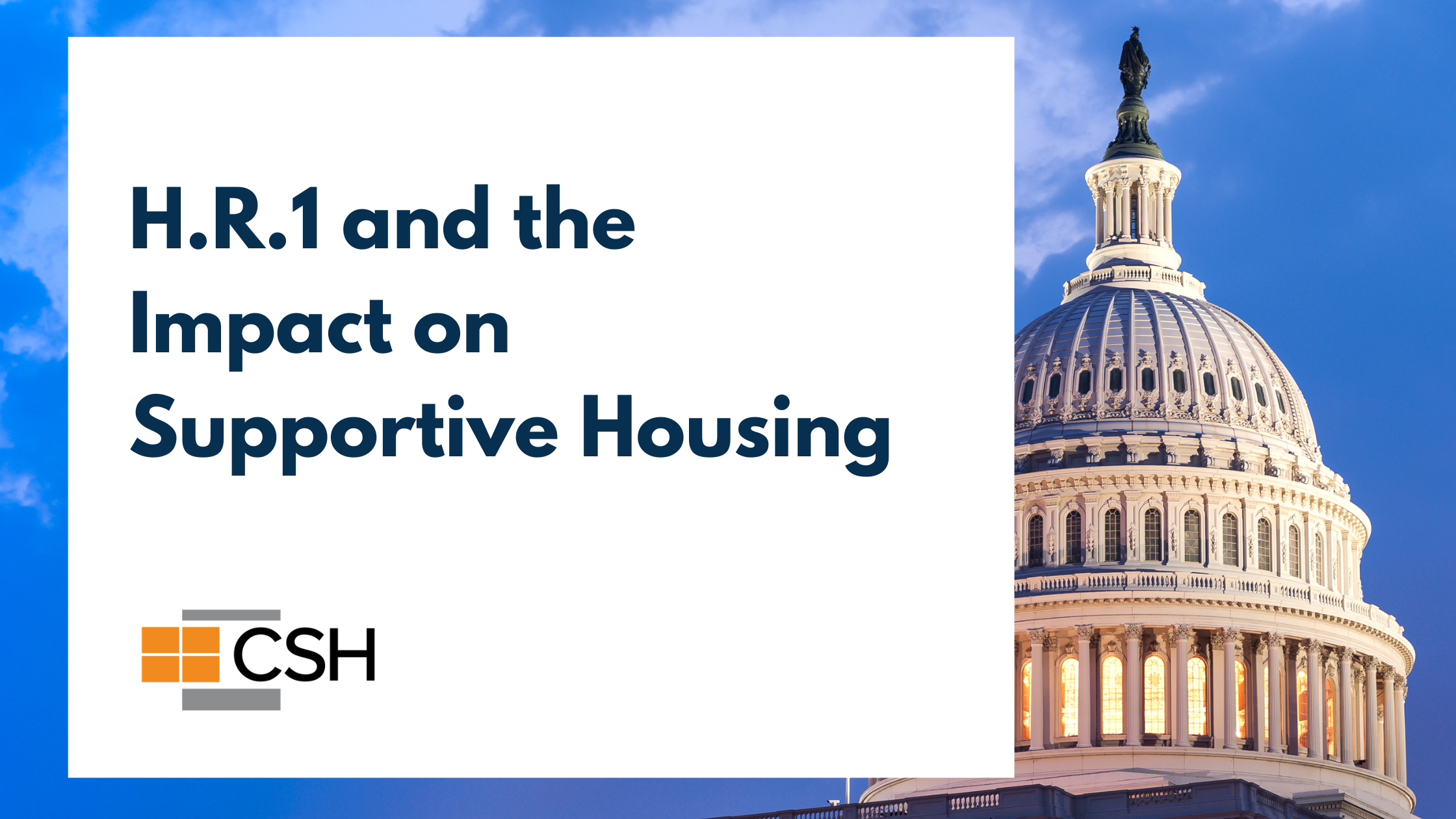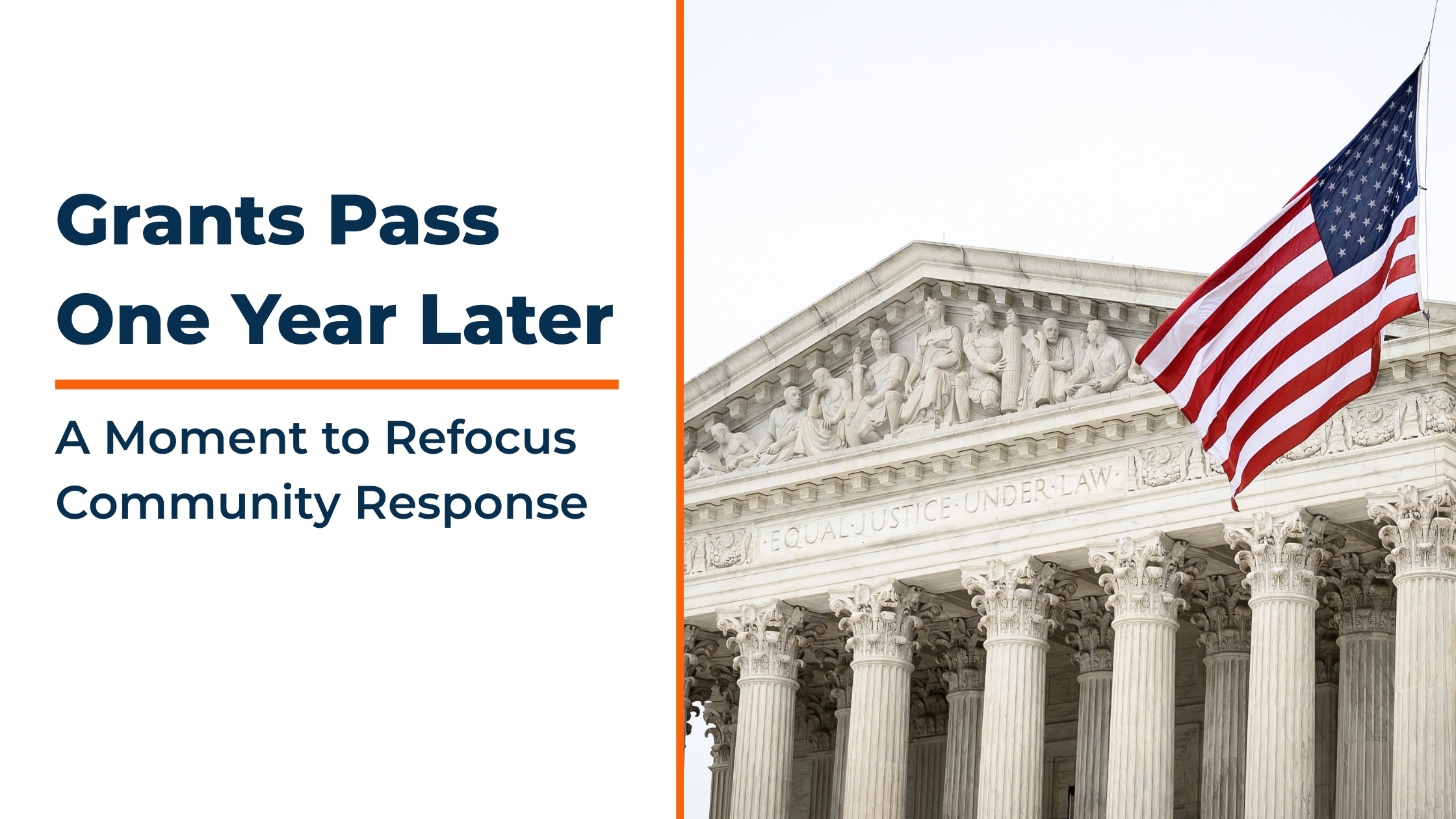This one-pager provides five proven state actions to reduce unsheltered homelessness. In response to recent executive orders, these practical, evidence-based strategies for responding to unsheltered homelessness deliver measurable results.
CSH Initiatives and Products: Policy and Advocacy
Share
Share on facebook Share on facebook Share on facebook Share on facebook Share on facebook Share on facebookPA Supportive Housing Coalition: Recommendations for the Pennsylvania Housing Action Plan
These recommendations encompass a statewide action plan to end homelessness and address Pennsylvania’s need for supportive housing. These recommendations incorporate feedback from the Pennsylvania Supportive Housing Coalition members along with core elements of other effective state plans on homelessness.
Share
Share on facebook Share on facebook Share on facebook Share on facebook Share on facebook Share on facebookSupportive Housing Impact Analysis of H.R.1, 119th Congress
H.R.1, as signed into law on July 4, 2025, contains more than three hundred provisions that change tax policies and entitlement programs, including many that impact the supportive housing industry and the people we serve. CSH’s initial impact analysis is focused on three sections of the law that will require state-level decisions in the short term.
Share
Share on facebook Share on facebook Share on facebook Share on facebook Share on facebook Share on facebookState Solutions to Ensure Continuous Medicaid Coverage for Eligible Individuals
H.R.1 includes requirements and budgetary changes that will make continuous health care coverage a challenge for individuals who are experiencing homelessness or have experienced homelessness and housing instability, including most supportive housing residents. This brief summarizes solutions to help states ensure that Medicaid eligible individuals remain enrolled and compliant with the new law.
Share
Share on facebook Share on facebook Share on facebook Share on facebook Share on facebook Share on facebookH.R.1 Reshapes Medicaid: What Housing Providers Need to Know Now
CSH Analyzes the Far-Reaching Impacts of the “One Big Beautiful Bill” on Health Coverage, Housing Services, and State Budgets
By Marcella Maguire, Ph.D., Director, Health Systems Integration at CSH
A major shift in federal health policy is underway with H.R.1, known as the “One Big Beautiful Bill” Act that the President signed into law on July 4. This law cuts Medicaid funding by approximately one trillion dollars over the next 10 years, introduces new eligibility requirements, and gives states broader discretion over coverage. The law is poised to impact how housing providers connect residents to critical health and supportive services, what services states cover via Medicaid and what populations states allow access to the Medicaid program. To assist the field in preparing for the significant impacts, CSH is analyzing the law’s impact in two ways:
- Prioritizing State Advocacy for Continuous Eligibility for Health Insurance Coverage. As the new rules and funding changes roll out, CSH will help community partners identify and advocate for state-level policies that protect access to health care coverage for those who are eligible for Medicaid and minimize harm.
- Protecting Housing-Related Services in State Budgets – As states begin planning their budgets for 2026 and beyond, they will need to account for major reductions in federal funding from HR1’s changes to Medicaid. As a result, state officials may need to cut programs that could include new services and services not yet implemented. Unfortunately, those cuts could include Housing Related Services, which are vital for supportive housing residents. To protect these programs supportive housing residents rely on, advocates and community partners must act quickly and strategically.
The Congressional Budget Office, a nonpartisan party that analyzes the impact of pending policy, predicts that the funding cuts will end health insurance coverage for 10 million people. We hope this information helps readers understand the discussions happening at the state and federal levels and how and when the bill might impact agencies and our communities. This blog post will summarize eight areas that the new law will impact the affordable and supportive housing sector, and upcoming posts will examine each of these in more detail.
The Anticipated Impact to State Medicaid Programs
Medicaid, managed by the Centers for Medicare & Medicaid Services (CMS), is the largest health insurer in the nation, with approximately 83 million people covered as of May 2025. As a national program with wide reach, policy and resources shifts take time. In fact, the real impact on recipients and providers could take a year or more to materialize. For example, although the Affordable Care Act was signed into law in 2010, Medicaid expansion in participating states did not begin until 2014. In short, Medicaid changes take time.
When the federal government reduces its Medicaid funding, states are left to make difficult decisions about how to save money. With significantly less funding from the federal government, states will be forced to:
- Offer fewer health and housing-related services
- Serve fewer people
- Decrease rates paid to healthcare providers
History tells us that often, states will first cut services for those who are aging and for people with disabilities. In states that have recently created a Medicaid financed Housing Related Services (HRS) benefit, critical resources for supportive housing may be at risk. Any state level Medicaid cuts would be part of the process that state governments use to manage taxpayer funds, and governors and state legislators will decide what cuts to make.
For people struggling to pay for rent, food and medications, suffering a medical crisis without having healthcare coverage could easily push them into homelessness. State level advocacy will be critical as states make difficult choices around state policies, implementation plans, and budget decisions.
CSH anticipates that the H.R.1 Medicaid changes will have the greatest impact on the affordable and supportive housing industry and residents in 8 areas:
1. Work Requirements
Persons who are Medicaid eligible due solely to low income will be required to prove 80 hours of “community engagement activities” at a minimum in the month prior to requesting Medicaid and every 6 months thereafter. What counts as a “community engagement activity” has some options determined, such as work, volunteer activity, or school, and CMS will provide more detail for states to implement this new work requirement prior to implementation at the start of 2027. Each state will determine their process for how someone proves they are compliant with this requirement.
2. Address Verifications
Address verifications are part of the bill’s efforts to ensure that no one is fraudulently enrolled in two state Medicaid programs, despite limited data to suggest that fraudulent activity occurs. States must develop a process and submit that process to CMS by October 1, 2027. CMS must have a process to receive that data two years later. Individuals who are enrolled in two states will likely be disenrolled. CMS will also issue guidance and collaborate with states to implement this portion of the law.
3. More Frequent Re-Determinations
Under the new law, individuals who qualify for Medicaid based solely on low income, will need to reverify their eligibility every six months instead of once a year. Because each state manages its own Medicaid enrollment process, the impact will vary. Some states prioritize enrolling all eligible individuals, while others focus more on strict compliance, sometimes at the expense of keeping eligible people covered. Homebase has an excellent national and California focused toolkit for supporting individuals through the redetermination process for Medicaid coverage.
4. Cost Sharing
Persons who qualify for Medicaid based solely on low income and with income between 100% to 138% of the federal poverty level, will now be required to share costs for coverage. This can mean monthly premiums or copays as services are delivered. States will have significant flexibility in how they implement cost sharing protocols. Studies show that even a co-pay of $1-5 means that people forego needed care.
5. New Limits to Coverage for Lawfully Present Immigrants
The new law makes it harder for states to use federal Medicaid funding to cover immigrants who have a recognized legal immigration status, known as “lawfully present.” Before H.R.1 was passed, most immigrants who had been lawfully present in the U.S. for five years could qualify for Medicaid, and states could receive federal matching funds to support their coverage. Under the new law, this coverage option for states will only be available to a small, select number of immigrant groups including Cubans, Haitians green card holders, and those from nations that are part of the Compact for Free Association.
Now, states must modify their programs to expect only federal matching funds for the limited number of immigrant groups listed above. These changes are expected to reduce access to care for many immigrants.
6. New Limits to Provider Taxes
Before the new law, states helped to pay for Medicaid using “provider taxes,” which were fees collected from hospitals and other healthcare providers. The new law places limits on how much states can rely on provider taxes. As a result, states that currently use high provider tax rates, like Arizona, Colorado, Connecticut, Michigan, Rhode Island, Vermont, and Virginia, may have to cut back on their Medicaid programs sooner than others. This could mean fewer services or reduced coverage for people who rely on Medicaid.
7. New Limits to Retroactive Coverage
Retroactive Medicaid coverage allows the program to pay for medical services received up to 90 days before someone officially enrolls as long as they were eligible during that time. Under the new law, states can only fund retroactive coverage for 30 days rather than the previously allowable 90 days. This means providers who assist those obtaining health insurance can only be paid for efforts 30 days prior to coverage start dates.
8. Home and Community Based Services (HCBS) Expansion
One promising change in the new bill is that it allows states to apply for new HCBS waivers to fund services for people who meet certain needs as defined by the state known as “Needs Based Criteria.” These waivers will fall under a part of Medicaid law called 1915(c), which allows states to offer HBCS. What is different now is that these waivers will not require people receiving services to meet the Nursing Facility Level of Care (NFLOC) criteria for the state. These waivers can be an opportunity to expand coverage of Housing Related Services and support more people.
In Conclusion
State level health advocacy efforts will be critical to how these eight areas will roll out at the state level, and your voice and the voices of the supportive housing industry and supportive housing residents can impact these decisions.
Decades of evidence and history prove that cutting federal funding for Medicaid and Medicare leads to substantial consequences for people’s overall health, healthcare providers, and the overall economy. When fewer people participate in healthcare coverage, costs can rise for everyone. These consequences can be even more catastrophic for people experiencing homelessness and housing instability.
Share
Share on facebook Share on facebook Share on facebook Share on facebook Share on facebook Share on facebookCSH Statement on Final Passage of Reconciliation Bill
New Challenges for Supportive Housing After Reconciliation Bill Passes the House
Congress has now passed the reconciliation bill, finalizing a set of policy changes that will have far-reaching effects on individuals experiencing homelessness and those living in supportive housing.
Supportive housing is effective because it combines affordable homes with access to healthcare and services. When those services become harder to access, the foundation of supportive housing becomes less stable and its impact more difficult to sustain.
While this legislation includes significant new resources for affordable housing and facility development by expanding Low-Income Housing Tax Credits and preserving the New Market Tax Credit program, it makes it harder for states to fund critical housing-related services. The bill restricts the ability of states to pay for Medicaid and adds administrative and eligibility barriers to healthcare and nutrition programs, making it harder for people to access services that help them remain stably housed. States now face making difficult budget decisions to close gaps or cut enrollment and services to balance their budgets.
CSH remains committed to supporting the field through this transition period. In the coming weeks, we will share a thorough analysis of the bill and materials to help providers and policymakers understand the implications, navigate the challenges, and take advantage of the new affordable housing resources. We will also monitor the proposed consolidation and funding reductions to the Continuum of Care program and rental assistance programs that are still being considered as part of the broader fiscal year 2026 appropriations process.
Our focus remains on ensuring that supportive housing remains a viable and effective solution to homelessness and housing insecurity. CSH will continue to advocate for sustained funding and infrastructure for supportive housing as Congress takes up additional budget legislation in the months ahead.
We are grateful to stand with all who have weighed in with their congressional delegations, and who we know will continue to fight for people and communities where no one is left behind.
Deborah De Santis
CSH President and CEO
Share
Share on facebook Share on facebook Share on facebook Share on facebook Share on facebook Share on facebookCSH Statement on Senate Passage of the Reconciliation Bill
CSH Calls for Balanced Policy That Protects Both Housing and Health Supports
The Senate’s passage of the reconciliation bill presents a deeply mixed outcome for the supportive housing field. While we acknowledge the inclusion of important housing provisions such as expanding and making permanent the Low-Income Housing Tax Credits and the New Markets Tax Credit, we cannot overlook the harmful trade-offs embedded in this legislation.
These housing investments, while significant, are not sufficient to offset the damage caused by provisions that undermine access to essential healthcare and basic supports for people experiencing homelessness and housing instability. The bill imposes new barriers to Medicaid and nutrition assistance that will disproportionately impact individuals with complex health and housing needs. These are the very people supportive housing is designed to serve.
Supportive housing succeeds because it pairs affordable homes with the services that help people stay housed and maintain their health. When the government restricts access to those services, it weakens the entire model. Limiting state Medicaid funding tools, imposing burdensome recertification requirements, and expanding work requirements for vulnerable populations all threaten the stability and well-being of those we serve.
CSH remains committed to advancing effective policies that recognize the interconnectedness of housing, healthcare, and human services. We urge Congress to consider the full impact of this legislation, not just its housing investments, but also the barriers it creates for those most in need and the burdens it places on the communities in their districts. We will continue to work with partners across sectors to ensure that supportive housing remains a viable and effective solution to homelessness and housing insecurity.
Deborah De Santis
CSH President and CEO
Share
Share on facebook Share on facebook Share on facebook Share on facebook Share on facebook Share on facebookGrants Pass One Year Later
Grants Pass Anniversary: A Moment to Refocus Community Response
One year ago, the U.S. Supreme Court issued its decision in Grants Pass v. Johnson, affirming that local governments had the authority to enforce certain public camping bans, even when individuals experiencing homelessness have no access to shelter. While the ruling allows jurisdictions to employ law enforcement, which could include issuing tickets or making arrests to people sleeping or camping in public spaces, decades of research tell us the most effective response to unsheltered homelessness is a pathway off the streets and into stable housing.
Across the country, local leaders are navigating rising rates of unsheltered homelessness and increasing public concern. We recognize that many policymakers want quick solutions to help individuals access the services and support they need and often prioritize temporary responses. While it is essential to create more housing that people experiencing homelessness can afford, it takes time and sustained investment. That’s why the strategies we choose in the short-term matter.
When communities rely on the law enforcement and legal system as their primary response to unsheltered homelessness, they incur significantly higher public costs and make little difference in the rate of people sleeping outside. These enforcement-based approaches often make it harder for individuals to access housing and employment due to the imposition of criminal records and fines, disrupting contact with outreach workers, and the loss of possessions like IDs and medication. In fact, failing to invest in evidence-based strategies results in missed cost offsets of approximately $6,875 per person—resources that could otherwise be redirected toward more effective solutions. Those are the facts.
CSH supports immediate, actionable strategies that connect people to outreach, short-term housing options, and essential services. These approaches work, as the City of Dallas recently proved – reaching an effective end to unsheltered homelessness.
However, short-term responses alone are not enough. To truly reduce homelessness, we must continue to press for long-term solutions like increasing housing supply – especially supportive housing, which pairs housing with services such as mental health care, substance use treatment, and tenancy support.
It is both possible and urgent that we address the rising number of people experiencing homelessness. Last year, we saw a record reduction in the number of veterans who were homeless – down almost 60% since 2010. This success is due in large part to the ongoing and increasing investment in the Veterans Administration Supportive Housing (VASH) program. If we can solve homelessness among veterans, surely, we can implement this winning approach more broadly, especially at a time when there is an alarming increase in the number of aging adults experiencing homelessness for the first time.
The anniversary of Grants Pass v. Johnson is a moment to reflect and refocus. We urge community leaders and lawmakers to prioritize responses that are grounded in evidence and designed to deliver lasting results. Now is the time to focus on what works – approaches that are accountable, fiscally responsible, and capable of delivering meaningful change.
Share
Share on facebook Share on facebook Share on facebook Share on facebook Share on facebook Share on facebookUsing Medicaid’s Housing Related Services (HRS) to Create New Supportive Housing
An increasing number of states are including coverage of Housing Related Services (HRS) in their Medicaid programs. These new services aim to provide more units of supportive housing and higher quality services. CSH has found that states who include these six strategies in their efforts are more likely to be successful. Learn more about these efforts, examples and concrete next steps your state can take to ensure these programs lead to greater supportive housing capacity and higher quality supportive housing statewide.
Share
Share on facebook Share on facebook Share on facebook Share on facebook Share on facebook Share on facebookWhite House Budget Cuts Critical Affordable and Supportive Housing Programs
Last week, the White House released the topline fiscal year 2026 (FY26) budget, which outlines significant changes and reductions in various programs, particularly within the U.S. Department of Housing and Urban Development (HUD). As the national leader in supportive housing, we are deeply concerned about the proposed budget, which includes significant cuts to affordable housing and critical community resources.
More than 30 years of data show that extreme cuts to federal housing and service funding at this magnitude would be catastrophic for millions of Americans teetering on the edge of homelessness and would devastate communities.
At a time when the nation is facing record homelessness and severe shortages of affordable housing, the proposed budget:
- Cuts funding to HUD by 45% – a staggering reduction of $33 billion from FY24.
- Eliminates affordable and supportive housing development tools, then restructures and cuts the massive federal rental assistance programs (housing vouchers) by $26.7 billion, compelling states to either fund or drastically reduce these programs. These cuts jeopardize the stability of more than 5 million households nationwide, which would force hundreds of thousands into homelessness and overwhelm emergency shelters.
- Makes significant policy changes to cap housing assistance at two years and “encourage” a 50% match from state and local governments, rewriting and reducing the federal role in this key aspect of the national safety net.
- Merges the Continuum of Care (CoC) grants and Housing Opportunities for Persons with AIDS (HOPWA) into the Emergency Solutions Grants (ESG) program, cutting total spending by $532 million.
- Eliminates key capital tools that create and preserve affordable housing development, including the Community Development Block Grant (CDBG), HOME Investment Partnerships Program, while significantly reducing funding for the Community Development Financial Institutions (CDFI) Fund in the Treasury budget.
The proposed budget also includes cutting over a quarter of funding for health services across multiple departments. This reduction targets critical community-based services that help people access healthcare and mental health support. It will make it harder for individuals to stay economically stable during challenging times. It proposes to eliminate programs that older adults and people with disabilities rely on, including $770 million in reductions for Community Services Block Grants, over a billion in cuts for Substance Abuse and Mental Health Services Administration (SAMHSA) grants, and the Low-Income Home Energy Assistance Program (LIHEAP) by more than $4 billion.
The budget released by the White House is a topline funding request, with more details expected in the coming weeks. Ultimately, Congress is responsible for making budget decisions.
CSH will continue to monitor the developments, share key information and advocacy alerts for the supportive housing field, and work with congressional members to ensure they preserve critical housing and services funding for the communities they represent.
In the coming days, we will share ways you can send advocacy messages to your congressional members. If you want to receive our advocacy alerts, please sign up.








